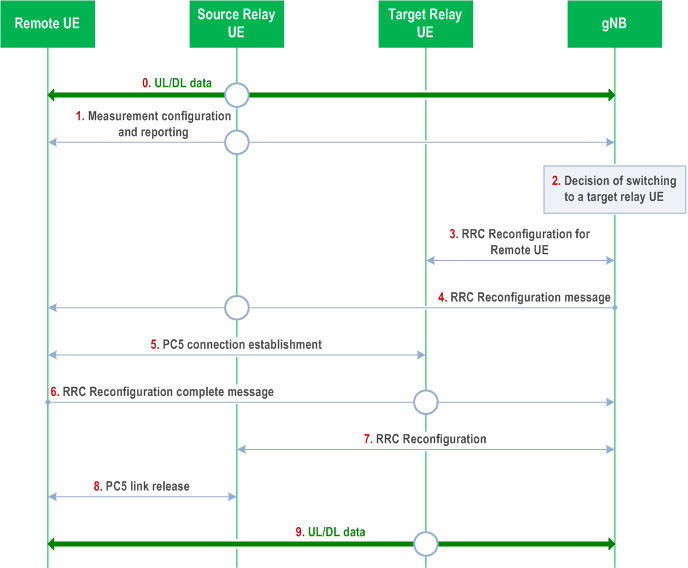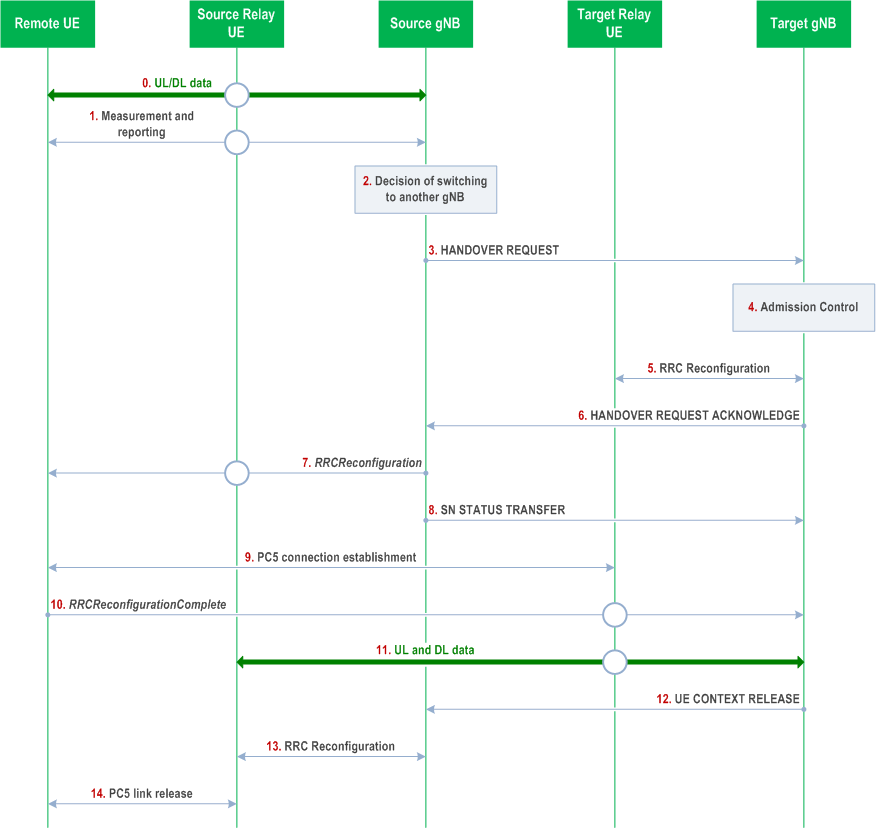Content for TS 38.300 Word version: 18.3.0
1…
4…
4.7…
5…
5.3…
5.4…
6…
6.2…
6.6…
7…
8…
9…
9.2.2…
9.2.2.5…
9.2.3…
9.2.3.2…
9.2.3.3…
9.2.4…
9.2.6…
9.3…
10…
11…
15…
15.5…
16…
16.2…
16.3…
16.4…
16.8…
16.9…
16.10…
16.12…
16.12.5…
16.12.6…
16.12.6.3
16.12.7
16.13…
16.14…
16.15…
16.18…
16.19…
16.21…
16.21.3…
17…
18…
19
20…
21…
A…
B…
C…
G…
16.12.6.3 Switching from indirect to indirect path |R18| p. 202
The gNB can select an L2 U2N Relay UE in any RRC state i.e., RRC_IDLE, RRC_INACTIVE, or RRC_CONNECTED, as a target L2 U2N Relay UE for indirect to indirect path switch.
For service continuity of L2 U2N Remote UE, the following procedure is used, in case of the L2 U2N Remote UE switching from indirect path via L2 U2N Relay UE to indirect path via a target L2 U2N Relay UE in RRC_CONNECTED under the same gNB:

Step 1.
For service continuity of L2 U2N Remote UE between gNBs, the following procedure is used, in case of the L2 U2N Remote UE, which is connected to indirect path, switching to another indirect path via a target L2 U2N Relay UE in RRC_CONNECTED under another gNB:
The L2 U2N Remote UE reports one or multiple candidate L2 U2N Relay UE(s) and sidelink measurement between the L2 U2N Remote UE and the source L2 U2N Relay UE to the source gNB, after it measures/discovers the candidate L2 U2N Relay UE(s):
Step 2.
- The L2 U2N Remote UE filters the appropriate L2 U2N Relay UE(s) according to relay selection criteria before reporting. The L2 U2N Remote UE shall report only the L2 U2N Relay UE candidate(s) that fulfil the higher layer criteria;
- The reporting includes at least a L2 U2N Relay UE ID, a L2 U2N Relay UE's serving cell ID, and a sidelink measurement quantity information. SD-RSRP is used as sidelink measurement quantity.
The gNB decides to switch the L2 U2N Remote UE to a target L2 U2N Relay UE under the same gNB.
Step 3.
The gNB sends an RRCReconfiguration message to the target L2 U2N Relay UE, which includes at least the L2 U2N Remote UE's local ID and L2 ID, Uu and PC5 Relay RLC channel configuration for relaying, and bearer mapping configuration.
Step 4.
The gNB sends the RRCReconfiguration message to the L2 U2N Remote UE. The RRCReconfiguration message includes at least the target L2 U2N Relay UE ID, Remote UE's local ID, PC5 Relay RLC channel configuration for relay traffic, and the associated end-to-end radio bearer(s). The L2 U2N Remote UE stops User Plane and Control Plane transmission over the indirect path via the source L2 U2N Relay UE after the reception of the RRCReconfiguration message from the gNB.
Step 5.
The L2 U2N Remote UE establishes PC5-RRC connection with the target L2 U2N Relay UE.
Step 6.
The L2 U2N Remote UE sends RRCReconfigurationComplete message to the gNB via the target L2 U2N Relay UE.
Step 7.
The gNB sends the RRCReconfiguration message to the source L2 U2N Relay UE to reconfigure the connection between the source L2 U2N Relay UE and the gNB. The RRCReconfiguration message to the source L2 U2N Relay UE can be sent any time after step 4 based on gNB implementation (e.g., to release Uu and PC5 Relay RLC channel configuration for relaying, and bearer mapping configuration related to the L2 U2N Remote UE).
Step 8.
Either source L2 U2N Relay UE's AS layer or L2 U2N Remote UE's AS layer indicates upper layers to release PC5 unicast link after receiving the RRCReconfiguration message from the gNB. The timing to execute link release is up to UE implementation after step 4 or step7.
Step 9.
The data path is switched from the source L2 U2N Relay UE to the target L2 U2N Relay UE between the L2 U2N Remote UE and the gNB. This step can be any time after step 6.

Step 1.
In case the selected L2 U2N Relay UE for indirect to indirect path switch is in RRC_IDLE or RRC_INACTIVE, after receiving the path switch command, the L2 U2N Remote UE establishes a PC5 link with the L2 U2N Relay UE and sends the RRCReconfigurationComplete message via the L2 U2N Relay UE, which triggers the L2 U2N Relay UE to enter RRC_CONNECTED state. The above procedures for L2 U2N Remote UE switching to indirect path can be also applied for the case that the selected L2 U2N Relay UE for indirect to indirect path switch is in RRC_IDLE or RRC_INACTIVE with the exception that the RRCReconfiguration message is sent from the gNB to the L2 U2N Relay UE after the L2 U2N Relay UE enters RRC_CONNECTED state, which happens during step 6 in Figure 16.12.6.3-1, and during step 10 in Figure 16.12.6.3-2.
The L2 U2N Remote UE reports one or multiple candidate L2 U2N Relay UE(s) and sidelink measurement between the L2 U2N Remote UE and the source L2 U2N Relay UE to the source gNB, after it measures/discovers the candidate L2 U2N Relay UE(s):
Step 2.
- The L2 U2N Remote UE filters the appropriate L2 U2N Relay UE(s) according to relay selection criteria before reporting. The L2 U2N Remote UE shall report only the L2 U2N Relay UE candidate(s) that fulfil the higher layer criteria;
- The reporting includes at least a L2 U2N Relay UE ID, a L2 U2N Relay UE's serving cell ID, and a sidelink measurement quantity information. SD-RSRP is used as sidelink measurement quantity.
The source gNB decides to trigger the L2 U2N Remote UE to switch to an indirect path of another gNB.
Step 3.
The source gNB sends a HANDOVER REQUEST message to the target gNB to prepare the path switch at the target side. The HANDOVER REQUEST message includes Remote UE L2 ID and a list of candidate target Relay UE IDs belonging to one cell of the target gNB.
Step 4.
Admission Control may be performed by the target gNB.
Step 5.
The target gNB selects one target Relay UE from the list of candidate Relay UEs provided by the source gNB, sends the RRCReconfiguration message to the L2 U2N Relay UE for relaying configuration, which includes at least the L2 U2N Remote UE's local ID and L2 ID, Uu Relay RLC channel and PC5 Relay RLC channel configuration for relaying, and bearer mapping configuration.
Step 6.
The target gNB sends the HANDOVER REQUEST ACKNOWLEDGE message to the source gNB, which contains RRC configuration for L2 U2N Remote UE at the target side.
Step 7.
The source gNB sends the RRCReconfiguration message to the L2 U2N Remote UE, which includes at least the target L2 U2N Relay UE ID, Remote UE's local ID, PC5 Relay RLC channel configuration for relay traffic and the associated end-to-end Uu radio bearer(s). The L2 U2N Remote UE stops User Plane and Control plane transmission over the (source) indirect path after reception of the RRCReconfiguration message from the source gNB.
Step 8.
The source gNB sends the SN STATUS TRANSFER message to the target gNB to convey the uplink PDCP SN receiver status and the downlink PDCP SN transmitter status of the L2 U2N Remote UE's DRBs for which PDCP status preservation applies (i.e. for RLC AM).
Step 9.
The L2 U2N Remote UE establishes PC5 connection to the target L2 U2N Relay UE.
Step 10.
The L2 U2N Remote UE sends the RRCReconfigurationComplete message to the target gNB via the target L2 U2N Relay UE.
Step 11.
The data path is switched from indirect path to indirect path between the L2 U2N Remote UE and the target gNB via the target L2 U2N Relay UE.
Step 12.
The target gNB sends the UE CONTEXT RELEASE message to inform the source gNB about the success of the path switch.
Step 13.
The source gNB sends the RRCReconfiguration message to the source L2 U2N Relay UE to reconfigure the connection between the source L2 U2N Relay UE and the source gNB. The RRCReconfiguration message to the source L2 U2N Relay UE can be sent any time after step 7 based on source gNB implementation (e.g., to release Uu Relay RLC channel and PC5 Relay RLC channel configuration for relaying, and bearer mapping configuration related to the L2 U2N Remote UE).
Step 14.
Either L2 U2N Relay UE or L2 U2N Remote UE's AS layer indicates upper layer to release PC5 unicast link after receiving the RRCReconfiguration message from the source gNB. The timing to execute link release is up to UE implementation.